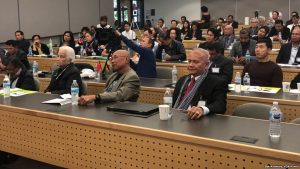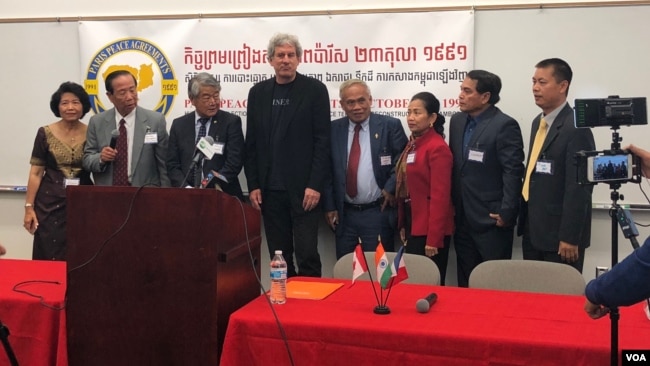Cambodian-Americans Call for International Pressure on Phnom Penh
Cambodian-Americans Call for International Pressure on Phnom Penh
Op-Ed: VOA Khmer

Cambodian-Americans and Cambodian-Canadians gathered to talk about Cambodia’s politics at the 26th Paris Peace Accord conference in Seattle, Washington, Saturday, October 14, 2017. (Sok Khemara/VOA Khmer)
The conference also discussed the legacy of the Paris Peace Accords, which ended Cambodia’s civil war in 1991 and enshrined pluralist democracy in Cambodian law.
SEATTLE, WASHINGTON — More international pressure should be brought to bear on the Cambodian government, Cambodian-Americans and Cambodian-Canadians said at a conference in Seattle, Washington, on Saturday.
The speakers at the conference, organized by the Khmer People Network for Cambodia (KPNC), discussed solutions to the current political impasse, which has seen the ruling Cambodian People’s Party move to dissolve the opposition Cambodia National Rescue Party and allocate its sets in parliament to minority parties and close critical media outlets.
Brad Adams, Asia director at Human Rights Watch, told participants that Prime Minister Hun Sen was leading an illegal “coup”.
“When you have a cold coup, there must be some public disapproval and public reaction. I don’t want anyone to get hurt but I believe it’s possible for people to show this,” he said.
He said that tens of millions of dollars in foreign aid were in jeopardy if the government continued down the same path it is currently taking.
“I can promise you that the gutless people who run institutions like the UN, the World Bank, the US State Department and the Japan Ministry of Foreign Affair will say, look, Cambodian people are not doing anything. Maybe they don’t really mind this,” he added. “No, I know that is not true at all. I am quite certain that if it’s a free and fair election, that Hun Sen would not have a chance. I have no doubt about that.”
Yem Rithipol, director of OMNI, an advocacy group based in the United States, said he hoped that as foreign aid was paid from tax dollars, Americans would consider withholding aid to apply pressure to the regime.
“If Americans find out that the American government wastes their money on a regime as well as acknowledging and cooperating with a regime considered a dictatorship [practicing] oppression, vote stealing … then the U.S. will react and demand aid be cut off,” he said.
The conference in Seattle was also a discussion about the legacy of the Paris Peace Accords, which ended Cambodia’s civil war in 1991 and enshrined pluralist democracy in Cambodian law.
Hun Sen, however, has recently called suggestions Cambodia should hold a new Paris conference “pointless”.
Van Sar, an activist from Washington State, compared the current government, which claims it is protecting Cambodian democracy by eliminating the opposition, with the Khmer Rouge, which labeled its state Democratic Kampuchea.
Seng Sophan, director of Election Committee for Cambodia, said next year’s planned election could not be “free and fair” if the opposition was dissolved.
“Then it will not only be the international community. Even its own citizens of 15 million people will probably condemn and consider that it is not free and fair. It’s just a political game to stay in power,” he said.

